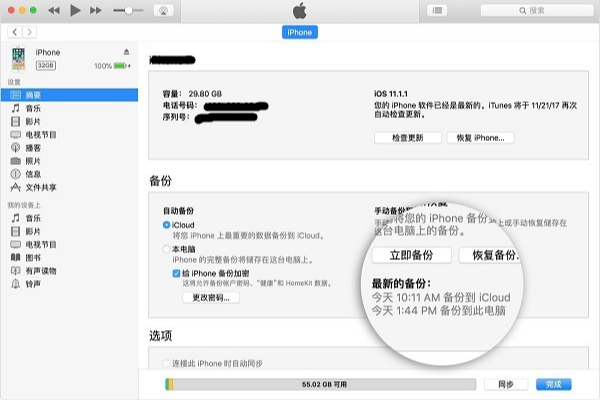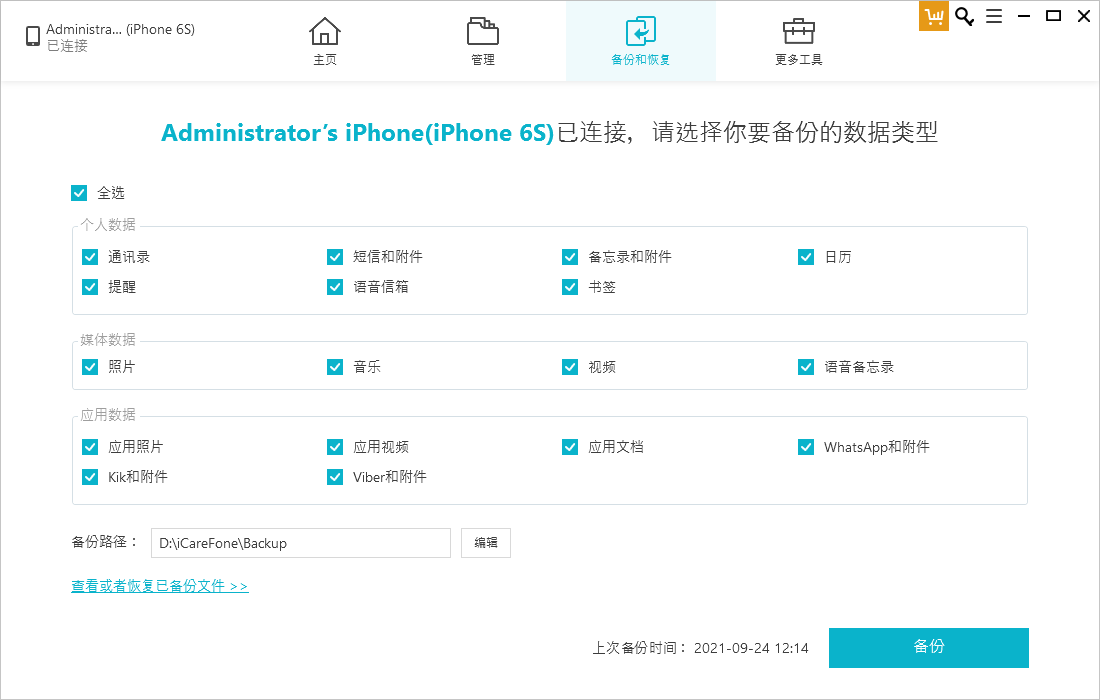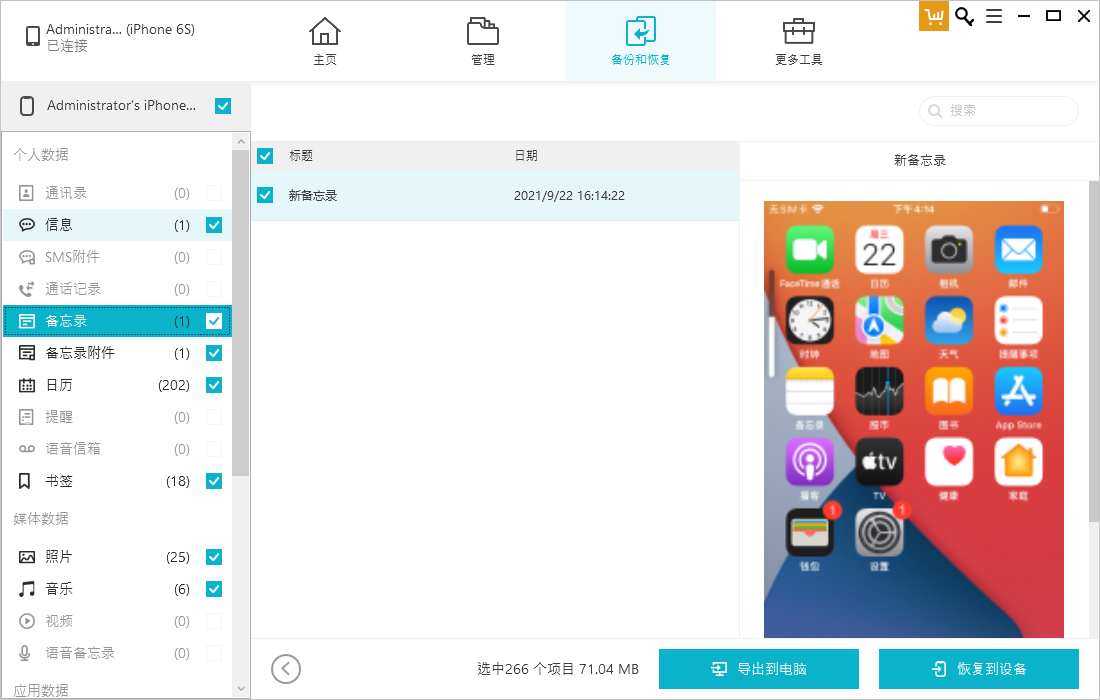[Must-learn for iOS16/15 update] How to completely back up iPhone data?
With the continuous improvements and updates of iOS16/15, we can enjoy new features and a smarter experience. More and more Apple fans have also chosen to upgrade to iOS16/15. However, system updates often encounter various problems, such as lags during the upgrade process or update failures, etc.
To ensure that your data will not be lost before updating to the latest version of iOS16/15, we recommend that you back up your iPhone before updating. In this tutorial, we will show you three methods to completely backup your iPhone. This will ensure that your data is safe and can be easily restored to its previous state after updating. The first method is to use iCloud for backup. You can find iCloud in settings and enable backup. Then you just have to wait for the backup to complete. Please make sure your iPhone is connected to a Wi-Fi network and has sufficient battery power. The second method is to use iTunes for backup. Connect your iPhone to your computer and open iTunes. In the device menu, select your iPhone and find the "Backup" option in the Summary tab. Click "Backup" and iTunes will automatically start backing up your iPhone data. The third method is to use a third-party backup tool such as iMazing or AnyTrans. These tools can provide more backup options and features, such as selecting specific data types to back up or setting up regular automatic backups. No matter which method you choose, backups are very important. This will ensure that your data is not lost during the update process and can be easily restored to its previous state. Remember to back up your iPhone before updating, and make sure the backup is complete before updating. That way, even if something unexpected happens, you can update with confidence, knowing your data is safe.
Method 1: Use iCloud to back up
- 1. Connect your device to the Internet. It is recommended to choose a reliable and stable WiFi environment.
- 2. Open the Settings application, find the iCloud option in the list, and click to enter.
- 3. After logging in and opening iCloud, open the apps in the list. Next, use the same Apple ID account on the new iPhone to log in to the iCloud service, and also open the applications in the list. In this way, you can import the address book on the old iPhone to the new phone. The backed up application data can be turned on/off as needed.

Method 2: iTunes Backup Data
First, open iTunes and make sure your iOS device is connected to the computer.
When using iOS devices, it is very simple to perform backup operations. First, you need to find and click on the icon of your iOS device. Once you click on the device icon, next you need to click on the [Back Up Now] button. In this way, you can start backing up your iOS device. Backup operations are very important to keep your data safe and ensure that your important files and information are not lost. So, don’t forget to perform backup operations regularly!

3. Wait for the iTunes backup to complete. Please wait patiently until the iTunes backup is completed. This process may take some time, depending on how much data you have on your device that needs to be backed up. Please do not interrupt this process before the backup is completed to avoid backup failure or data loss. You can continue with subsequent operations after the backup is complete.
Please follow the steps below to check whether the backup is successful: 1. Open the Edit menu. 2. Select a preference option. 3. In the device options, confirm whether the backup time and device name are accurate.
Method 3: Use Apple data management tools to back up for free
In addition to using iTunes, there is another way to back up iPhone data. This is the Apple Data Full Backup Tool, a professional software that can help us back up photos, contacts, text messages and other data for free with one click. Moreover, it also supports selective backup. After the backup is completed, we can preview and export the data online, which is very simple and convenient.
To back up the data on your iPhone, just download and open the Apple data management tool on your computer. Then, use the data cable to connect the iPhone to the computer. Next, click the "Backup and Restore" option in Apple's data management tool, and then click "Go to Backup Device." Finally, click "Backup" and wait for the full machine backup to complete. In this way, the data on your iPhone will be successfully backed up to the computer.

#The steps for backup are as follows: First, after completing the backup, click on the "View" option. Here, we can directly view the backed up data. Of course, you can also choose to check the data and select "Export to Computer" in the lower right corner to export the data to your computer for local storage. In this way, we can easily save the backed up data to the computer.

The above are three methods for iPhone data backup. If unfortunately you encounter data loss after upgrading to iOS16/15, don’t worry, because you can use backup to restore the data to ensure that the data will not be lost!
If your iPhone data is lost and you didn’t back it up in advance, don’t worry, because there are data recovery tools provided by Apple that can help you recover your data!
The above is the detailed content of [Must-learn for iOS16/15 update] How to completely back up iPhone data?. For more information, please follow other related articles on the PHP Chinese website!

Hot AI Tools

Undresser.AI Undress
AI-powered app for creating realistic nude photos

AI Clothes Remover
Online AI tool for removing clothes from photos.

Undress AI Tool
Undress images for free

Clothoff.io
AI clothes remover

Video Face Swap
Swap faces in any video effortlessly with our completely free AI face swap tool!

Hot Article

Hot Tools

Notepad++7.3.1
Easy-to-use and free code editor

SublimeText3 Chinese version
Chinese version, very easy to use

Zend Studio 13.0.1
Powerful PHP integrated development environment

Dreamweaver CS6
Visual web development tools

SublimeText3 Mac version
God-level code editing software (SublimeText3)

Hot Topics
 1672
1672
 14
14
 1428
1428
 52
52
 1333
1333
 25
25
 1277
1277
 29
29
 1257
1257
 24
24
 How to upgrade your M2 Mac mini without paying Apple's high prices
Apr 27, 2025 pm 05:31 PM
How to upgrade your M2 Mac mini without paying Apple's high prices
Apr 27, 2025 pm 05:31 PM
The Mac mini, despite its affordability and powerful processors rivaling Apple's pro machines, suffers from a significant limitation: its non-upgradable internal components. This guide provides solutions for enhancing your M2 and M2 Pro Mac mini (M4
 Is iMessage not working? Here's how to fix it on your iPhone, iPad, and Mac
Apr 27, 2025 pm 06:00 PM
Is iMessage not working? Here's how to fix it on your iPhone, iPad, and Mac
Apr 27, 2025 pm 06:00 PM
Troubleshooting iMessage Issues on iPhone, iPad, and Mac Experiencing problems with iMessage? This guide offers solutions for common issues, helping you fix your messaging app on Apple devices. Whether messages aren't appearing, are out of order, o
 Where did that app go? How to find a missing app on iPhone or iPad
Apr 27, 2025 pm 05:54 PM
Where did that app go? How to find a missing app on iPhone or iPad
Apr 27, 2025 pm 05:54 PM
Finding a Missing iOS or iPadOS App: A Step-by-Step Guide iOS and iPadOS allow app searching by name, but locating them becomes tricky with numerous folders and Home Screen pages. This guide offers two methods to recover missing apps and add them ba
 The Apple Watch Is 10 Years Old. Here's Why I Never Bought One
Apr 15, 2025 am 06:09 AM
The Apple Watch Is 10 Years Old. Here's Why I Never Bought One
Apr 15, 2025 am 06:09 AM
The Apple Watch: Still Not Convinced After a Decade Despite over 200 million units sold since 2015, the Apple Watch remains absent from my wrist. While its health and fitness features are impressive, they don't appeal to someone like me who doesn't
 Word on iPhone Can Turn Your Voice Notes Into Documents
Apr 22, 2025 am 03:02 AM
Word on iPhone Can Turn Your Voice Notes Into Documents
Apr 22, 2025 am 03:02 AM
Microsoft Word for iOS now transforms your voice notes into fully formatted documents using Copilot AI. This latest enhancement simplifies document creation on mobile devices. To access this feature, tap the "New" button ( ), select "U
 The Best iPads of 2025
Apr 18, 2025 am 01:01 AM
The Best iPads of 2025
Apr 18, 2025 am 01:01 AM
Choosing the Right iPad: A Comprehensive Guide Apple's iPad lineup offers a tablet for every need, but selecting the perfect one can be overwhelming. This guide simplifies the process, helping you choose the ideal iPad based on your specific requirem
 Smartphones Are Boring Now and It's Our Fault
Apr 23, 2025 am 03:06 AM
Smartphones Are Boring Now and It's Our Fault
Apr 23, 2025 am 03:06 AM
The golden age of smartphones has passed? Future Outlook Technology enthusiasts often complain that modern mobile phones are the same and lack of innovation. Although manufacturers are to blame, we also play an important role. Let us review the development history of smartphones and explore the causes of the current situation. The Golden Age of Smartphones In 1973, Motorola engineer Martin Cooper made historic calls with the DynaTAC 8000X on the streets of New York. This "brick" phone opened the era of wireless networks. Nearly 20 years later, IBM Simon was released, becoming the world's first smartphone, equipped with a resistive touch screen and simple applications. Today, although it is a hundred times more powerful, the core function of modern smartphones is still used as an application portal. Early innovation slows down
 How to Turn Off Mail Categories on iPad
Apr 28, 2025 am 11:33 AM
How to Turn Off Mail Categories on iPad
Apr 28, 2025 am 11:33 AM
The Mail App updated on iPadOS 18.4 introduces the mail category feature. The feature is designed to automatically categorize inbox messages in the Mail App into specific categories, including "Main", "Transaction", "Update" and "Promotion", as well as a nearly hidden "All Mail" option. While this feature is designed to clean up and organize users’ inboxes, in practice, many users find that the Mail Category feature prioritizes old useless messages (such as DoorDash promotional emails a few months ago) and hides recent useful messages from real people (such as family, friends, colleagues). In addition, the Mail Category feature adds an additional layer of interaction between the inbox in the Mail App and the actual view of all messages. For these reasons, and other




